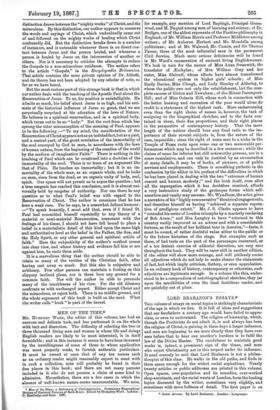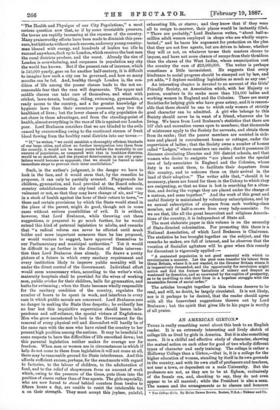LORD BRA.BAZON'S ESSAYS.*
Tuts volume of essays on social topics is strikingly characteristic of the age in which we live. It is full of ideas and suggestions that our forefathers a century ago would have failed to appre- ciate, or even to understand. The religion of humanity, which, though the Positivists do not admit it, is and always has been the religion of Christ, is gaining in these days a larger influence, and men are beginning to see more clearly than they have ever seen before that to bear one another's burdens is to fulfil the law of the Divine Master. The carefulness to maintain good works is, indeed, a prominent sign of the times, and men who reject Christianity act in this respect under its influence. It need scarcely be said that Lord Brabazon is not a philan- thropist of this class. He walks in the old paths, and finds in them space enough for the widest social aspirations. Nearly twenty articles or public addresses are printed in this volume. Open spaces, over-population and its remedies, over-worked shop-assistants, and the social wants of London, form the leading topics discussed by the writer, sometimes very slightly, and sometimes with more fullness of detail. The first paper is on
• Social Arrow. By Lord Brabason. London: Loolrotoso.
"The Health and Physique of our City Populations," a most serious question now that, as if by some irresistible pressure, the towns are rapidly increasing at the expense of the country. Many praiseworthy efforts have been made to diminish this pres- sure, but hitherto without much success, and every young country- man blessed with energy, and hundreds of loafers too idle to succeed anywhere, flock up to London, which receives the best men the rural districts produce, and the worst. Already the size of London is overwhelming, and surpasses in population any city the world has known. But if the present rate of increase, which is 340,000 yearly, goes on for another half-century, it is difficult to imagine how such a city can be governed, and how so many mouths can be fed. And, healthy though London is, the con- dition of life among the poorer classes leads to the not un- reasonable fear that the race will degenerate. The upper and middle classes can take care of themselves, and what with cricket, lawn-tennis, boating, riding, swimming, gymnastics, a ready access to the country, and a far greater knowledge of hygienic laws than their ancestors possessed, may live the healthiest of lives ; but the lower classes of a city population do not share in these advantages, and from the standing-point of health, almost everything in the race of life is against our London poor. Lord Brabazon considers that we are blinded to the evils caused by overcrowding owing to the continued stream of fresh blood flowing from the healthy rural districts into our towns :—
" If," he writes, we could establish a thoroughly efficient blockade of our large cities, and allow no further immigration into them from the country, it would not be many years before the mortality in our centres of popalation, as compared with that in healthier districts, would be so marked, and the physical deterioration in our city popu- lations would become so apparent, that we should be forced to take immediate steps to prevent their utter annihilation."
Such, in the author's judgment, is the danger we have to look in the face, and it would seem that, by the remedies he proposes, it can only be partially arrested. Playgrounds for children, gymnastics, and food provided at the Board schools, country establishments for city-bred children, whether con- valescent or not, so that they may have change of air, and " lay in a stock of health against the hour of their return to town,"— these and certain provisions by which the State would stand in the place of the parent, might do good, though not in some cases without serious possibilities of evil. It is evident, however, that Lord Brabazon, while throwing out these suggestions, is prepared to go much further, for he would extend this kind of paternal legislation to adults, and remarks that "a radical reform can never be effected until much bolder and more important measures than he has proposed, or would venture to suggest, have approved themselves to our Parliamentary and municipal authorities." Yet it would be difficult to go farther in the direction of State interven- tion than Lord Brabazon does already. He draws a pretty picture of a future in which every sanitary requirement and every institution likely to improve public morality will be under the direct control of the Government. Individual effort would seem unnecessary when, according to the writer's wish, maternity hospitals shall be provided for the wives of working men, public creches for their children, halls for gymnastics, and baths for swimming ; when the State becomes wholly responsible for the sanitary condition of the country, regulates the number of hours to be spent in work, and interferes in every case in which public morals are concerned. Lord Brabazon sees no danger in making the State thus despotic; he evidently has no fear lest this inquisitive supervision should lessen inde- pendence and self-reliance, the special virtues of Englishmen. Men who grow accustomed to look to the Government for the removal of every physical evil and discomfort will hardly be of the same race with the men who have raised the country to her present high position among the nations. It may be beneficial in some respects to have the difficulties of life smoothed down; but this parental legislation neither makes for courage nor for freedom. When men or women are in circumstances in which if help do not come to them from legislation it will not come at all, there may be reasonable ground for State interference. And this affords sufficient excuse, perhaps, for the enactments with regard to factories, to the labour of children, to the adulteration of food, and to the relief of shopwomen from an amount of work which, owing to the pressure of the times, puts them into the position of slaves rather than of free agents. The girls especially, who are now forced to stand behind counters from twelve to fifteen hours a day, are unable to resist the intolerable tax u on their strength. They must accept this joyless, painful,
exhausting life, or starve; and they know that if they were all to resign to-morrow, their places would be instantly filled. " There are probably," Lord Brabazon writes, "about half.a. million adult women employed in shops who are wholly unpro- tected ;" and he bases his argument for protection on the plea that they are not free agents, but are driven to labour, whether they will or not, on whatever terms their masters choose to impose, and have not more chance of escape from their thraldom than the slaves of the West Indies, whose emancipation cost the country the sum of £20,000,000. The writer is perhaps sometimes a little inconsistent. He suggests that every hindrance to social progress should be stamped out by law, and yet adds, "I deplore meddling legislation as much as any one.'
An interesting chapter is devoted to an account of the Girls' Friendly Society, an Association which, with her Majesty as patron, numbers in its ranks MOM than 124,000 ladies lad working women in England and the Colonies. There are many Societiee for helping girls who have gone astray, audit is reason- able that there should be one to which only women of strictly good character can be admitted. A girl who belongs to this Society should never be in want of a friend, wherever she be living. We learn from Lord Brabazon's statistics that there are 167 club and recreation moms open to members; that thousands of mistresses apply to the Society for servants, and obtain them from its ranks; that the poorer members are assisted in sick- ness and placed in convalescent homes or cottages, under the supervision of ladies ; that the Society owns a number of homes called "Lodges," where members can reside ; that it possesses 23 diocesan circulating libraries and 306 district schools, and that women who desire to emigrate "are placed under the special care of lady-associates in England and the Colonies, whose , duty is to assist them, to facilitate their departure from this country, and to welcome them on their arrival in the
• land of their adoption." The writer adds that, "should it be necessary, places are found for them, in the Colony to which they are emigrating, so that no time is lost in searching for a situa- tion, and during the voyage they are placed under the charge of a matron, and mess together." And the work of this great and useful Society is maintained by voluntary subscriptions, and by an annual subscription of sixpence from each working-class member, and of half-a-crown from every lady-associate. So we see that, like all the great benevolent and religions Associa- tions of the country, it is independent of State aid.
The most elaborate paper in this volume is on the necessity of State-directed colonisation. For promoting this there is a National Association, of which Lord Brabazon is Chairman. The statistics he has brought together on the subject, and the remarks he makes, are full of interest, and he observes that the vocation of Socialist agitators will be gone when this remedy for discontent is vigorously applied :—
" A contented population is not good material with which to revolutionise a country. Let the poor man transfer his labour from Great Britain, where it is not wanted, to the Greater Britain where it is imperatively demanded, and the opportunity for revolution might arrive and find the former battalions of misery and despair so weakened by desertion, and so enervated by the caprice of prosperity, as to be unwilling to risk their lives in a hopeless struggle with the irresistible forces of social order."
The articles brought together in this volume deserve to be read, and will, no doubt, be largely circulated. It is not likely, nor is it perhaps to be desired, that the reader should agree with all the benevolent suggestions thrown out by Lord Brabazon ; but the spirit that gives life to his pages is worthy of all praise.



































 Previous page
Previous page